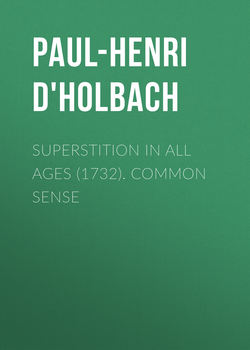Читать книгу Superstition In All Ages (1732). Common Sense - Paul-Henri d'Holbach - Страница 63
COMMON SENSE
LX. – WE CAN NOT BELIEVE IN A DIVINE PROVIDENCE, IN AN INFINITELY GOOD AND POWERFUL GOD
ОглавлениеIs not God the master of His favors? Has He not the right to dispense His benefits? Can He not take them back again? His creature has no right to ask the reason of His conduct; He can dispose at will of the works of His hands. Absolute sovereign of mortals, He distributes happiness or unhappiness, according to His pleasure. These are the solutions which theologians give in order to console us for the evils which God inflicts upon us. We would tell them that a God who was infinitely good, would not be the master of His favors, but would be by His own nature obliged to distribute them among His creatures; we would tell them that a truly benevolent being would not believe he had the right to abstain from doing good; we would tell them that a truly generous being does not take back what he has given, and any man who does it, forfeits gratitude, and has no right to complain of ingratitude. How can the arbitrary and whimsical conduct which theologians ascribe to God, be reconciled with the religion which supposes a compact or mutual agreement between this God and men? If God owes nothing to His creatures, they, on their part, can not owe anything to their God. All religion is founded upon the happiness which men believe they have a right to expect from the Divinity, who is supposed to tell them: "Love, adore, obey me, and I will render you happy!" Men on their side say to Him: "Make us happy, be faithful to your promises, and we will love you, we will adore you, we will obey your laws!" In neglecting the happiness of His creatures, in distributing His favors and His graces according to His caprice, and taking back His gifts, does not God violate the contract which serves as a base for all religion?
Cicero has said with reason that if God does not make Himself agreeable to man, He can not be his God. [Nisi Deus homini placuerit, Deus non erit.] Goodness constitutes Divinity; this Goodness can manifest itself to man only by the advantages he derives from it. As soon as he is unfortunate, this Goodness disappears and ceases to be Divinity. An infinite Goodness can be neither partial nor exclusive. If God is infinitely good, He owes happiness to all His creatures; one unfortunate being alone would be sufficient to annihilate an unlimited goodness. Under an infinitely good and powerful God, is it possible to conceive that a single man could suffer? An animal, a mite, which suffers, furnishes invincible arguments against Divine Providence and its infinite benefactions.
